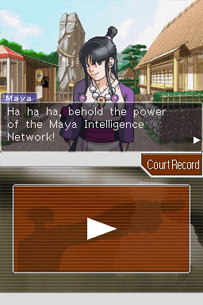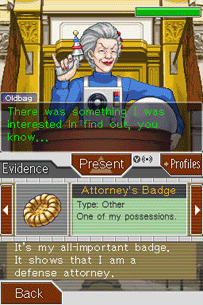This classic GameCola article was originally published in July, 2008.
![]() I must admit, the first time I started playing this series, I had no idea what to expect. I knew it was wildly popular, but the question was…why? I had no idea. It was something I needed to discover for myself. Needless to say, I discovered why. So then I went on to the second installment. Partially because I wanted to know what happened, and partially because I wanted to see what had changed from then to now.
I must admit, the first time I started playing this series, I had no idea what to expect. I knew it was wildly popular, but the question was…why? I had no idea. It was something I needed to discover for myself. Needless to say, I discovered why. So then I went on to the second installment. Partially because I wanted to know what happened, and partially because I wanted to see what had changed from then to now.
Graphics-wise, there’s really nothing different, aside from locations and characters and such. Of course, this was to be expected, and for me, the visuals are as wonderfully captured as they are in the first game. The large sprites work wonderfully and don’t really have that “sprite” feel to them, I think. It’s kind of like where the Street Fighter Alpha 3 character taunts come to life and start acting like…well, as normal as you can get in Phoenix Wright’s world.
Audio-wise, however, I think this game took a grave hit. Granted, this is a remake and there’s not much that can be done about the actual tracks used in the game, but I feel that a lot of the tracks that were changed took a turn for the worse. I don’t feel as if the courtroom music actually fits that well most of the time, whereas, in the first game, it feels very serious and law-like. However, the up side is that they did change the detention center music for the better, setting the mood a whole lot better than it did in the first game.
The story is the reason I play the game. Of course, there’s some spots that seem a little obvious as to what will happen, but, for the most part, there’s enough twists and turns to keep you guessing right up to the end as to what will happen. This game knows what it does and does it extremely well. As much as I’d love to talk about the storylines and why it gets really good, to do that would be a spoiler with just about all of the stories, so I will not be discussing them here. Let’s just say that some routes that pop up that were fairly unexpected to me.
The characters all have their own charm to them. They all have their own odd quirks and most are very memorable. There are some characters in this game I really wished I could punch square in the face. When I want to do that to a character, there’s no denying that the game has to be awesome. To sum it up, the characterization in this game is top notch.
Gameplay-wise, there’s not a whole lot to it. The stylus is the way you maneuver about: examining things, talking to people, looking for clues, presenting evidence in court, etc. It’s not a lot, but it really makes things much easier compared to a D-pad and buttons. You press “Start” to save your game when you need to.
This game, compared to its predecessor, has more to it. This time, you can present profiles as evidence in court. For example’s sake, let’s say Ben Dover stole a candy bar from Sandy Beach. If the judge asks you who stole the candy bar, you would go to “Profiles” in the court record and present Ben Dover’s profile. Also, there’s a new tool you can use to find the secrets of the people you’re talking to during investigations. It is a bit of a pain to do, since it involves presenting evidence to people, but it does make sense, since not everyone is actually interested in spilling their guts to Phoenix Wright.
One of my complaints of Phoenix Wright: Ace Attorney (which I did not review here) is that sometimes the pieces of evidence you need to present in court seem to be a bit on the illogical side. That still happens in this game, but to a lesser extent. It seems to phase out as the game goes on.
Replay-wise, I hate to say it, but this ranks in the same category as NES games like Shadowgate, Déjà Vu, and Uninvited. Once you know what’s going on in the story, unless the stories really hit home for you and you want to play them again, there’s no real reason to play through the cases again unless you’re the type that likes to read the same book over and over again. Not that there’s anything wrong with that, but nothing was compelling me to actually give the game a second play. There’s nothing that can done about that, though. It’s not like you can tap the game with a magic wand, chant a few phrases of abracadabra hocus pocus and WHOOSH! New plot! Multiple endings could be a possible solution, but then you’d have a Mortal Kombat-type situation in which you’re left hanging with everyone’s ending, waiting to see which ones were actually true or not. If someone decided to cancel the game series at some point, there just might be questions that have gone unanswered.
While I am a fan of this game, I have tried to remain impartial and review it for what it is. As I’m normally one to review bad games, I usually have a lot of bad things to say about games. Sorry, but I don’t have as many for this one. Obviously it’s not perfect, but to fully enjoy a game, sometimes you just have to ignore the flaws and enjoy it for what it is. There’s no such thing as a perfect game—just a perfect game for you. Remember that, folks!




